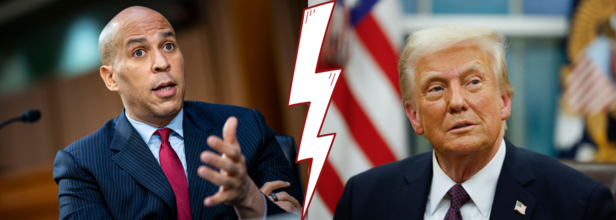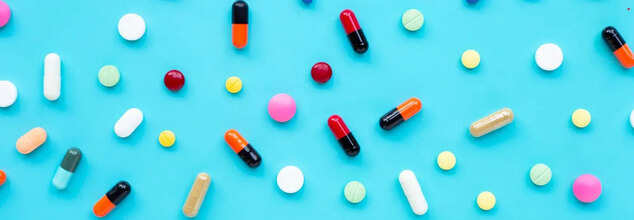
(L to R) Democratic Senator Cory Booker; US President Donald Trump (Getty Images)
Senator Cory Booker's Longest Speech In History Criticizes Trump's Health Policy, Details Inside
Senator Cory Broker, a Democrat from New Jersey delivered the longest recorded speech in Senate history. This has surpassed Strom Thurmond's 1957 filibuster against civil rights legislation. Booker's speech lasted for over 24 hours and was indeed a passionate critique of Trump administration's healthcare policies, especially its proposed cuts to Medicaid and other essential health programs.
His speech was framed as a moral stand against what he described as a 'healthcare crisis' in the United States.
The Democrat's marathon address was a symbolic protest against President Donald Trump, where he warned of the "grave and urgent" moment in American history. It went on for 25 hour and four minutes. The speech started at 7pm on Monday, where he vowed to speak as long as he is "physically able" to and ended past sunset on Tuesday, at 8.05 pm.
What Was The 25-hour Speech All About?
Booker began his speech not just tied to a specific bill but aimed to delay a vote on a Democratic-led measure to overturn Trump's tariffs on Canada. His decision to speak for such an extended period was also symbolic. He opposed the idea that the longest Senate speech was held by a segregationist.
His speech was heavily focused on healthcare policy and was addressed at Trump administration's efforts to cut funding for key health programs. These included:
Medicaid Cuts: He condemned Trump's budget proposals which sought to significantly reduce Medicaid funding. He argued that such cuts could harm low-income Americans and people with disabilities.
Access to Affordable Care: He also criticized the administration's attempts to dismantle the Affordable Care Act, which he said had expanded healthcare access for millions.
Maternal and Child Health: He then went on to highlight how cuts to government health programs would disproportionately affect pregnant women, infants, and children in vulnerable communities.
Pharmaceutical Industry Influence: He also spoke abut the rising cost of prescribed drugs. He accused the administration of failing to hold pharmaceutical companies accountable for their actions.
Policies That Booker Opposed
The main focus of his speech was his opposition to Trump's repeated attempts to weaken the healthcare protections. He argued that the administration's policies often prioritized tax cuts for the wealthy, hinting that Trump administration operates like a business and not like the government of the people. These tax cuts for wealthy are made at the expense of funding essential health services. He also denounced Trump's efforts to impose work requirements on Medicaid recipients, which he said would strip millions of Americans of healthcare coverage.
What Was The Reaction Like?
As Booker went on record, there were cheers everywhere in the Senate chamber. He also acknowledged Thurmond's legacy while emphasizing that he stood in defiance of the policies Thurmond had supported. Democrats, including Senate Minority Leader Chuck Schumer also praised his stamina and message and called it "tour de force".
The White House dismissed the speech, calling it a "publicity stunt" and referencing a precious moment when Booker declared "I am Spartacus" during Brett Kavanaugh's Supreme Court confirmation hearings.
In all, Booker remained firm in his belief that this was indeed a "moral moment" and it required action. His record-breaking speech was not just about policy, but more than that. It was about defending fundamental right to healthcare for all Americans.
“This is not right or left, it is right or wrong,” he declared. “This is not a partisan moment. It is a moral moment. Where do you stand?”

Credit: Canva
Women Are Overmedicated Due To Male-Dominated Drug Trials: Study
Women are frequently overmedicated, which leads to an increased risk of adverse side effects, a recent study conducted by scientists from the University of Chicago and the University of California discovered. This discrepancy arises because drug dosages are typically based on trials conducted predominantly on male subjects. "Drugs are optimized from the beginning to work on male bodies," explained Professor Brian Prendergast, a psychologist at the University of Chicago and co-author of the study. He also added that there was a need to immediately reevaluate the widespread practice of prescribing the same doses to men and women.
Side-Effects Range From Nausea To Seizures
It has long been recognized by scientists and medical professionals that women experience more side effects from medications than men, even when doses are adjusted for body weight. These side effects can range from mild symptoms such as headaches and nausea to more severe reactions like bleeding and seizures. Historically, women were excluded from clinical drug trials due to the mistaken belief that hormonal fluctuations would distort test results.
'Biomedical Science Is Done On Men, By Men'
"For much of the time it’s been practiced, biomedical science has been done by men, on men," said Prendergast. "It even starts in the petri dish: Most cell lines used in early tests are male, and then drugs are tested on male lab animals."It is pertinent to note that since 1993, the National Institutes of Health has mandated the inclusion of both men and women in clinical trials, with stricter enforcement following a pivotal 2014 study co-authored by Prendergast. That study demonstrated that hormonal cycles in female mice did not interfere with drug testing outcomes.
Despite these regulations, women remain underrepresented in many drug trials, and studies that do include them often fail to analyze or publish sex-specific data. Moreover, numerous medications approved before the 1993 mandate remain in use without adjustments for sex-based differences in drug metabolism.
Study Identifies 86 Drugs With Sex Difference
The study was published on June 5 in the journal Biology of Sex Differences. For the trials, Prendergast and co-author Irving Zucker of UC Berkeley analyzed publicly available data from clinical drug studies. They identified 86 drugs that exhibited clear sex differences in metabolism. The findings revealed that women metabolize nearly all these drugs more slowly than men, resulting in prolonged exposure and, in 96% of cases, significantly higher rates of adverse side effects.
The medications examined include widely used drugs such as aspirin, morphine, and heparin, along with common antidepressants like sertraline and bupropion.
While every individual metabolizes medications differently, women generally retain drugs in their bloodstream and tissues longer than men. The liver and kidneys also process drugs at varying rates between sexes, an effect that persists even when dosage is adjusted for body weight.
“The reasons for these big differences are not fully understood, but this is a really striking result and a wake-up call,” Prendergast stated.
Study Proposes Several Recommendations
To address this issue, the study’s authors propose several recommendations. They advocate for the FDA to disclose the gender composition of study participants in clinical trial data, label drugs known to have sex-based metabolic differences, and ensure that this information is integrated into medical education.
"There are a lot of drugs that are prescribed on a ‘one-size-fits-all’ basis, and it’s clear that this doesn’t always work," Prendergast emphasized. "Especially for drugs that we already know have a wide therapeutic range—meaning a broad range of doses can be effective—we could do a much better job of adjusting dosages based on sex."
This approach would involve starting women on lower doses and gradually increasing the amount until achieving optimal efficacy with minimal side effects. "We have an opportunity to do this better," Prendergast concluded. "This information needs to be widely available."

Credit: Canva
8 Foods That May Help Reduce Risk Of Erectile Dysfunction
Eating a well-balanced, nutrient-rich diet can prove to be a magic bullet for your health and well-being, including reproductive health. Certain foods, such as spinach, carrots, and avocados, contain key nutrients that contribute to improved blood flow and hormone balance.
The foods you consume provide essential nutrients that fuel the body, including sexual organs. Some studies suggest that maintaining a well-balanced diet may help reduce the likelihood of erectile dysfunction. Below are eight foods that may support sexual health and testosterone levels.
Fruits & Vegetables That Can Prevent Erectile Dysfunction
1. Spinach
Spinach is a rich source of folate, a nutrient known to enhance blood circulation. Folic acid plays a crucial role in male sexual function, and low levels have been linked to erectile dysfunction. A cup (240 grams) of boiled spinach provides 66% of the daily recommended intake of folate. Additionally, spinach contains magnesium, which promotes blood flow and may reduce the risk of erectile dysfunction.
2. Caffeine
Caffeine may have a role in preventing erectile dysfunction, though research findings are mixed. A 2014 study involving over 3,000 men found that those with a higher caffeine intake (85 to 300 mg per day) reported fewer instances of erectile dysfunction. However, a 2024 review of studies involving more than 51,000 men did not establish a significant link between caffeine consumption and erectile dysfunction.
3. Apples
Apples are high in flavonoids, natural plant compounds that offer various health benefits. A 2016 review identified apples as a top source of flavonoids such as anthocyanins, flavones, and flavanones. Increased consumption of these compounds was linked to a 19% lower risk of erectile dysfunction. Additionally, apple peels contain ursolic acid, which has shown potential in inhibiting prostate cancer cell growth.
4. Avocados
Avocados have long been associated with fertility and sexual health. They are rich in vitamin E and zinc, both of which contribute to sperm quality and testosterone production. A 2024 review suggests that avocados may enhance sexual duration, reduce premature ejaculation, increase attraction, and improve overall sexual satisfaction.
5. Chile Peppers
A 2015 study found that men who preferred spicier foods had higher testosterone levels in their saliva. While this does not confirm that spicy foods directly boost testosterone, the compound capsaicin found in hot peppers may have benefits. A 2013 study suggested that capsaicin stimulates pleasure centers in the brain, potentially enhancing mood and serving as an aphrodisiac.
6. Carrots
Carrots contain carotenoids, which may help improve testosterone production, sperm count, and sperm motility. Given that low testosterone levels are linked to erectile dysfunction, consuming carrots may help manage hormone levels.
7. Oats
Oats contain L-arginine, an amino acid that helps relax blood vessels, potentially improving blood flow to the penis. Some studies suggest L-arginine may aid in treating erectile dysfunction and boosting testosterone levels. Additionally, oats have been classified as an aphrodisiac that may enhance libido.
8. Tomatoes
Tomatoes are packed with antioxidants, including lycopene, which may support sexual and reproductive health. A 2024 review found that individuals with lower lycopene intake had a higher risk of erectile dysfunction. Tomatoes are also rich in vitamin C and polyphenols, which may reduce inflammation and improve blood flow. A 2017 study involving men with infertility suggested that consuming tomato juice for 12 weeks improved sperm motility.
Can Diet Alone Cure Erectile Dysfunction?
While there is limited research on whether diet alone can reverse erectile dysfunction, a 2020 review found that following a Mediterranean diet—rich in fruits, vegetables, whole grains, legumes, and healthy fats—may help prevent the condition.

Credits: Canva
US Healthcare Is Becoming More Unaffordable By The Day
A new poll found that the number of American adults who are unable to afford necessary health care services and medications has reached its highest level since 2021. This is as per an analysis by Gallup and West Health. The findings show a growing gap in access to quality health care, especially between the high and the low-income Americans.
What Does The Data Say?
As per the numbers, 11% of adults in 2024, which makes it around 29 million people were classified as "cost desperate". This means that they lacked access to affordable care and were unable to pay for necessary medical treatments. This figure has increased from 8% in 2021. The survey was conducted form November 18 to December 27. This included responses from more than 6,200 adults.
What Is The Impact On Minority Communities?
The financial burden of health care is affecting certain demographic groups more than others. The percentage of Hispanic adults categorized as cost desperate increased from 10% in 2021 to 18% in 2024. Similarly, 14% of Black adults faced cost desperation in 2024, up from 9% in 2021. In contrast, the percentage of white adults in this category remained steady at 8%.
At the same time, the number of Americans classified as "cost secure"—those who can access and afford quality care—has fallen significantly. Only 51% of adults reported feeling financially secure about their health care costs in 2024, down from 61% in 2022. The decline was especially sharp for Hispanic and Black adults, with only 34% of Hispanic respondents and 41% of Black respondents feeling cost secure, compared to 51% and 54% in 2021, respectively.
Is There A Gap Between Income Levels?
The data also highlight that there is a financial divide in health care access between high and low income households. Among individuals earning less than $24,000 annually, the percentage of those categorized as cost desperate rose sharply from 14% in 2021 to 25% in 2024. In contrast, for those earning $180,000 or more, cost desperation fell from 2% to just 1% over the same period.
Increasing Concerns Over Health Care Affordability
As financial strain increases, more Americans are worried about their ability to afford health care when needed. In 2024, 35% of adults said they would be unable to pay for medical services if required, compared to 29% in 2021. The data suggests that economic pressures are making it harder for people to access timely and necessary medical treatments.
Policy Changes and Their Potential Impact
The affordability crisis is unfolding at a time when key policy decisions could make access to health care even more challenging for many Americans. Medicaid, the largest source of health care coverage in the U.S., is at risk of severe funding cuts under a House-passed budget proposal that could slash up to $880 billion over the next decade. If enacted, such cuts would likely force millions of low-income individuals off Medicaid, exacerbating financial and health disparities.
Additionally, new tariffs proposed by the Trump administration could drive up drug prices. Analysts warn that if major exporters of generic medications, such as India, are affected by these levies, the cost of essential prescription drugs could increase, leading to further accessibility issues.
A Growing Crisis With No Clear Solution
The findings indicate that access to affordable health care is becoming more difficult for millions of Americans, particularly those in lower-income brackets and minority communities. With policy shifts and economic challenges on the horizon, health care affordability remains a pressing concern for many, with no immediate solutions in sight.
© 2024 Bennett, Coleman & Company Limited

